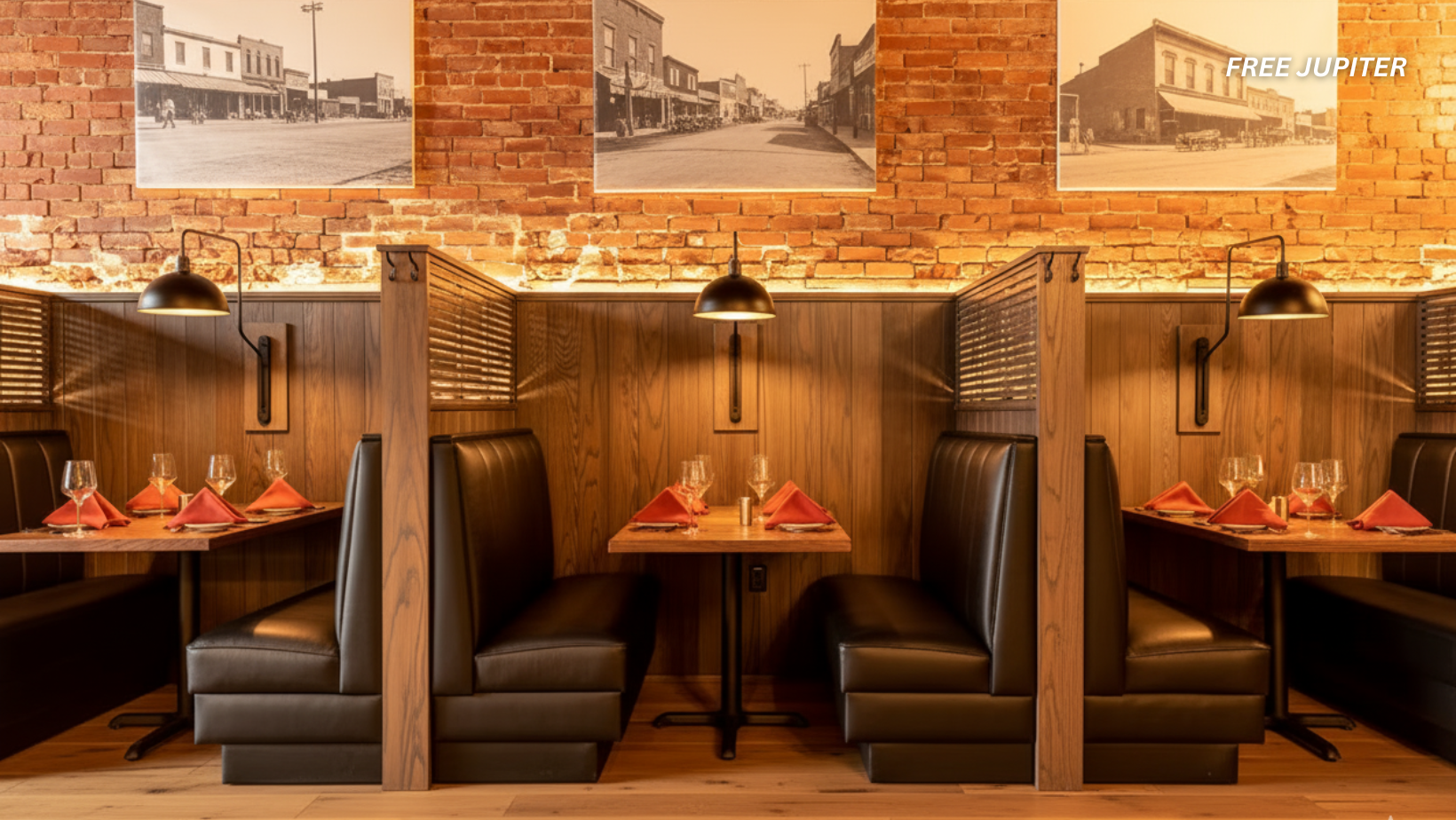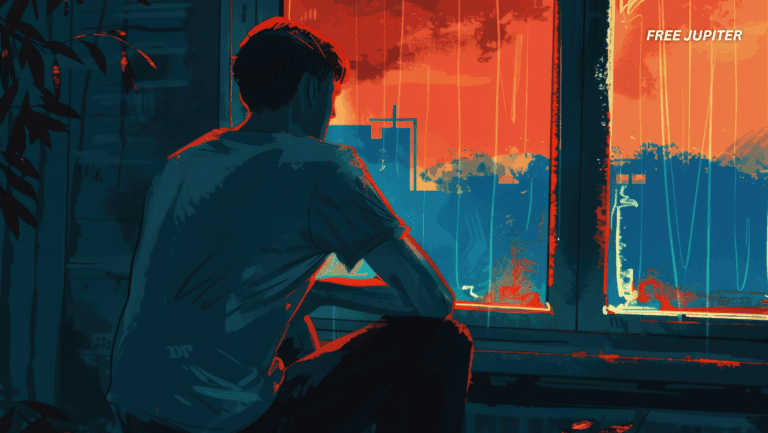When the host at a restaurant asks, “Booth or table?” some people hesitate. Others have no doubt at all: they pick the booth every single time. That quick decision may look trivial, but everyday preferences often tell subtle stories about personality, values, and even how someone relates to the world around them.
From the soft cushions to the semi-private feel, booths create a very different experience than open tables. Environmental psychologists note that even small decisions — where to sit, how close to stand, what lighting to choose — reflect deep-seated needs for comfort, safety, and connection. In that sense, the booth choice is not random.
Here are eight things a consistent preference for booths can reveal about someone.
1. A True Appreciation for Comfort and Coziness
Booths are the restaurant equivalent of a favorite armchair or a warm blanket on a chilly evening. They’re soft, padded, and shielded from the main flow of foot traffic. People who gravitate toward them often prioritize comfort not only when eating but in many areas of life — from home décor to travel choices.
This inclination suggests an appreciation for life’s simple pleasures: warm drinks, soft lighting, familiar scents, and spaces that feel welcoming rather than formal. For such personalities, dining out isn’t only about the food; it’s also about creating a mini-retreat from the noise of the day. A booth delivers exactly that — a pocket of ease and contentment.
Read more: Meet the “Otrovert,” A New Personality Type That May Describe You Better Than Anything
2. Valuing Privacy and Personal Space
Tables in the middle of a room can feel like a stage. Conversations may be overheard, passersby brush against chairs, and the openness can feel exposing. Booths, with their high backs and enclosed shape, naturally buffer against that exposure.
This preference often signals someone who values clear boundaries and autonomy. It doesn’t mean being antisocial — it means liking to choose when and how to engage. In psychology, such a trait aligns with healthy self-regulation and introspection. People who prize privacy often thrive in environments where they can manage noise, distance, and attention on their own terms.
3. A Natural Instinct for Security and Predictability
There’s a reason booths feel safe: the back is protected, there’s a clear view of the room, and the layout is more predictable than scattered tables. This taps into a basic human instinct for refuge — an evolutionary echo of needing to see what’s coming while staying shielded from behind.
Researchers call this the “prospect-refuge” preference. Seats that combine visibility (prospect) with cover (refuge) reduce background stress and help people feel grounded. Choosing a booth can therefore signal someone who likes stable environments and who feels calmer when surroundings are easy to read and anticipate. It’s not about fear; it’s about creating the conditions to fully relax.
4. Enjoying a Slower Pace and Mindful Moments
Booths encourage lingering. Unlike open tables that can feel temporary or transactional, booths invite guests to settle in, savor a meal, and stretch out a conversation. People who regularly pick booths often show the same tendency elsewhere: they like to take their time with experiences, rather than rush.
This trait connects to mindfulness — the ability to be present and notice small details. Whether it’s a morning coffee, an evening walk, or an unrushed chat with a friend, the same mindset appears: life feels richer when moments are savored rather than skimmed.
5. A Gentle Nostalgia for the Past
Booths carry a hint of the classic diner or retro café. They evoke family breakfasts, road-trip stops, or after-school milkshakes. For many, that pull toward booths is partly nostalgia.
Psychologists have found that nostalgia — far from being a weakness — can regulate mood and strengthen a sense of belonging. Preferring booths may hint at someone who values continuity with the past: revisiting favorite places, rewatching old movies, or listening to songs linked to fond memories. It’s not being “stuck” in the past; it’s appreciating the roots that shaped one’s present.
6. A Focus on Relationships and Shared Experience
Because booths seat people close together, they literally change the social dynamic at a meal. Sitting side by side or in a semicircle promotes more eye contact, easier sharing of food, and a feeling of togetherness.
Someone who chooses booths often may also be someone who invests deeply in relationships. They like settings that bring people closer, not just physically but emotionally. In daily life, that might show up as being a reliable listener, a thoughtful friend, or a family member who creates rituals and shared experiences. Choosing a booth becomes another way of nurturing connection.
7. A Quiet Independent or Rebellious Streak
Many restaurants subtly prefer diners to sit at tables — they’re easier to reset, move, and turn over. Yet some people will politely but firmly request a booth even if it means waiting longer. This small act signals autonomy.
It’s a gentle form of rebellion: knowing what feels right and sticking to it. Such people aren’t necessarily confrontational; they simply honor their preferences without guilt. In bigger life choices, this can translate to reliability, authenticity, and staying true to personal values even when trends shift.
Read more: If You’re a Type B Personality, You Probably Do These Things Without Realizing It
8. A Keen Sensitivity to Atmosphere and Design
Booths usually have softer lighting, reduced noise, and a more contained visual field. People who pick them may be more attuned to sensory details — how a space looks, sounds, and feels. This environmental sensitivity isn’t just aesthetic; it shapes mood and focus.
Research on seating preferences in cafés shows that people rate seats not only for privacy but also for how pleasant or overstimulating they expect the experience to be. Preferring a booth may reveal someone who actively curates surroundings to support well-being. They are aware that atmosphere matters and choose accordingly.
How Everyday Choices Reflect Deeper Patterns
None of these traits are absolute. Plenty of warm, relationship-oriented people prefer tables, and plenty of privacy-seekers end up at open seating. But repeated patterns — like always requesting a booth — can hint at enduring preferences.
Psychologists studying environmental behavior note that small, consistent choices often mirror big themes in a person’s life: comfort vs. novelty, closeness vs. openness, control vs. spontaneity. Recognizing these patterns can help people understand themselves and design their spaces accordingly — at home, at work, or even on vacation.
Why It Matters
A booth may look like just another seat, but it can represent a micro-decision about how to experience life. Comfort, privacy, nostalgia, mindfulness, closeness, autonomy, and atmosphere — these are not trivial. They shape how people rest, connect, and recharge.
And because so much of modern life is fast, bright, and open, carving out small pockets of refuge can be a form of self-care. Choosing a booth is one way of saying, “This moment matters. Let’s make it comfortable and meaningful.”
Read more: What Your Favorite Food Says About Your Personality, According to Psychologists
The Psychology of Simple Preferences
From the outside, “booth or table” looks like a throwaway question. Yet inside that choice are clues about how someone balances comfort and novelty, privacy and openness, tradition and change.
The next time a host asks, “Booth or table?” and someone answers without hesitation, it may not just be about the seat. It may be about who they are, what they value, and how they quietly shape their world — one small, padded bench at a time.
Featured image: Gemini Recreation.
Friendly Note: FreeJupiter.com shares general information for curious minds. Please fact-check all claims and double-check health info with a qualified professional. 🌱










